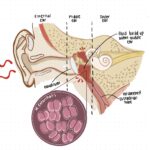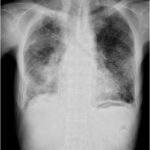Moraxella catarrhalis is a gram-negative, aerobic, diplococcus bacterium that primarily colonizes the respiratory tract. While it is often a harmless commensal organism, it can become a pathogenic agent, particularly in individuals with chronic obstructive pulmonary disease (COPD) or weakened immune systems. One of the major infections it causes is bronchitis, particularly in adults with underlying lung conditions.

Understanding Moraxella Catarrhalis in Bronchitis
Bronchitis is the inflammation of the bronchial tubes, leading to mucus production, cough, and respiratory discomfort. M. catarrhalis is a known bacterial pathogen responsible for exacerbations of chronic bronchitis, especially in older adults and smokers.
How Moraxella Catarrhalis Causes Bronchitis
When M. catarrhalis colonizes the lower respiratory tract, it can trigger an inflammatory response, leading to bronchial irritation, excessive mucus production, and obstruction of airflow. It is particularly concerning in patients with:
- Chronic obstructive pulmonary disease (COPD)
- Immunosuppression
- Recurrent respiratory infections
Risk Factors
Individuals at a higher risk of developing Moraxella catarrhalis bronchitis include:
- Elderly individuals
- Smokers
- Patients with COPD or asthma
- Individuals with weakened immune systems
Symptoms of Moraxella Catarrhalis Bronchitis
The symptoms of M. catarrhalis bronchitis are similar to other bacterial respiratory infections. Common symptoms include:
- Persistent cough with mucus production (yellow or green sputum)
- Shortness of breath
- Wheezing
- Chest discomfort
- Fever (in some cases)
In COPD patients, M. catarrhalis can cause acute exacerbations, worsening lung function and leading to hospitalization.
Diagnosis of Moraxella Catarrhalis Bronchitis
Clinical Examination
A physician may diagnose bronchitis based on symptoms and medical history. However, laboratory tests are often required to confirm the presence of M. catarrhalis.
Laboratory Tests
- Sputum Culture: Identifies M. catarrhalis in respiratory secretions.
- Gram Staining: Reveals gram-negative diplococci.
- Polymerase Chain Reaction (PCR): Detects bacterial DNA for precise identification.
- Blood Tests: May be conducted in severe cases to rule out systemic infections.
Treatment Options for Moraxella Catarrhalis Bronchitis
Antibiotic Therapy
While some cases of bronchitis resolve on their own, bacterial infections like M. catarrhalis require targeted antibiotic treatment. Effective antibiotics include:
- Amoxicillin-clavulanate
- Cefuroxime
- Doxycycline
- Azithromycin or clarithromycin
- Fluoroquinolones (e.g., levofloxacin, moxifloxacin)
Supportive Care
- Bronchodilators: Improve airflow and ease breathing.
- Mucolytics: Help thin mucus for easier clearance.
- Hydration: Keeps mucus thin and promotes clearance.
- Rest and Humidified Air: Helps soothe the airways and promote recovery.
Prevention Strategies
Vaccination
Although no direct vaccine for M. catarrhalis exists, pneumococcal and influenza vaccines can help prevent respiratory infections that may lead to secondary bacterial infections.
Lifestyle Modifications
- Quit smoking to reduce bronchial irritation.
- Practice good hygiene to minimize bacterial transmission.
- Manage COPD or asthma effectively with prescribed medications.
Moraxella catarrhalis bronchitis is a significant cause of respiratory infections, particularly in individuals with COPD or weakened immunity. Prompt diagnosis and appropriate antibiotic therapy can help manage the condition effectively. Preventative measures, such as vaccination and smoking cessation, can further reduce the risk of infection. If symptoms persist or worsen, seeking medical attention is essential for proper treatment and recovery.

